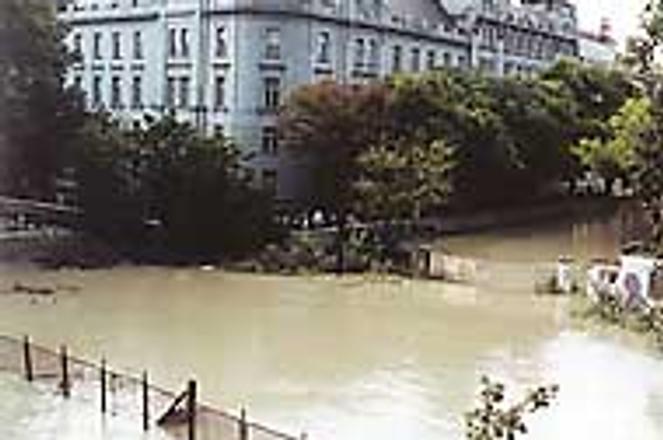HUNDREDS of curious onlookers watched waters approach the gates of Bratislava's Comenius University.photo: Ján Svrček
THE SUN came out for several hours in the Slovak capital August 15, but Bratislava remained under a flood alert following a week of rain and the highest water levels in the Danube river the city has seen for over a century.
Firefighters, soldiers, police and transport officials worked steadily to protect the city from the extent of flooding that has devastated Germany and the neighbouring Czech Republic and Austria.
Hundreds of locals and curious tourists watched the river spill over the banks of the Danube and inundate low-lying areas around the university, the harbour and near the Petržalka suburb. The depth of water in the Danube reached 932 centimetres August 15, about three times its normal level, and was expected to rise over 10 metres in Bratislava before starting to recede on Friday.
Agriculture Ministry officials said that thanks to the Gabčíkovo hydro dam 30 kilometres downstream, water levels could be managed to prevent serious flooding in Bratislava.
The situation was far more serious in the Devín village closer to Vienna, however, with both access roads cut off by flooding and electricity supplies in danger of failing.
Inhabitants from the district's Slovanské nábrežie area were boated to work August 14, and virtually all inhabitants of Devín, which lies at the confluence of the Danube and Morava rivers, had their bags packed for higher ground - the local school and the community center.
At the same time, waters had begun to recede in central Slovakia's Banská Bystrica, Brezno and Žiar nad Hronom districts which were hit by high water from the Hron river during the first week of August.
Slovak bishop František Tondra appealed to all believers in traditionally Catholic Slovakia to pray for the waters to recede, while Prime Minister Mikuláš Dzurinda hurried to assure people that the state was ready to help stricken areas recover.
"The state will not let them down. As soon as the water subsides, we will address the consequences with both financial and material aid," the PM said after visiting Devín.
At a meeting of the central Anti-Flood Commission (ÚPK), Agriculture Minister Pavol Koncoš admitted that waters might hit levels not seen in the last 500 years, depending on developments with the Czech Morava and Dyje rivers.
The ÚPK expected the flow of water would peak on August 16 at Devín at 11,860 cubic metres per second, 1,200 cubic metres greater than during devastating floods in 1954.
Local citizens watching soldiers fill sandbags and police cordon off streets seemed worried, particularly after shots of a submerged Prague Old Town hit Slovak television screens. "When is this finally going to stop? " asked Jana Málková, 43, watching the waters near the Old Bridge in Bratislava.
Finance Minister František Hajnovič was tasked by the government on August 14 with finding money to help stricken areas, but said he would not hazard a guess of what the final bill might be.
Reports of heavy damage particularly to transport infrastructure had been accumulating all week.
Dzurinda appealed to Slovaks to show solidarity with compatriots who were being "tested particularly hard by the waters".
The PM also said the Slovak cabinet was prepared to help neighbouring countries, particularly Austria and the Czech Republic, if asked.


